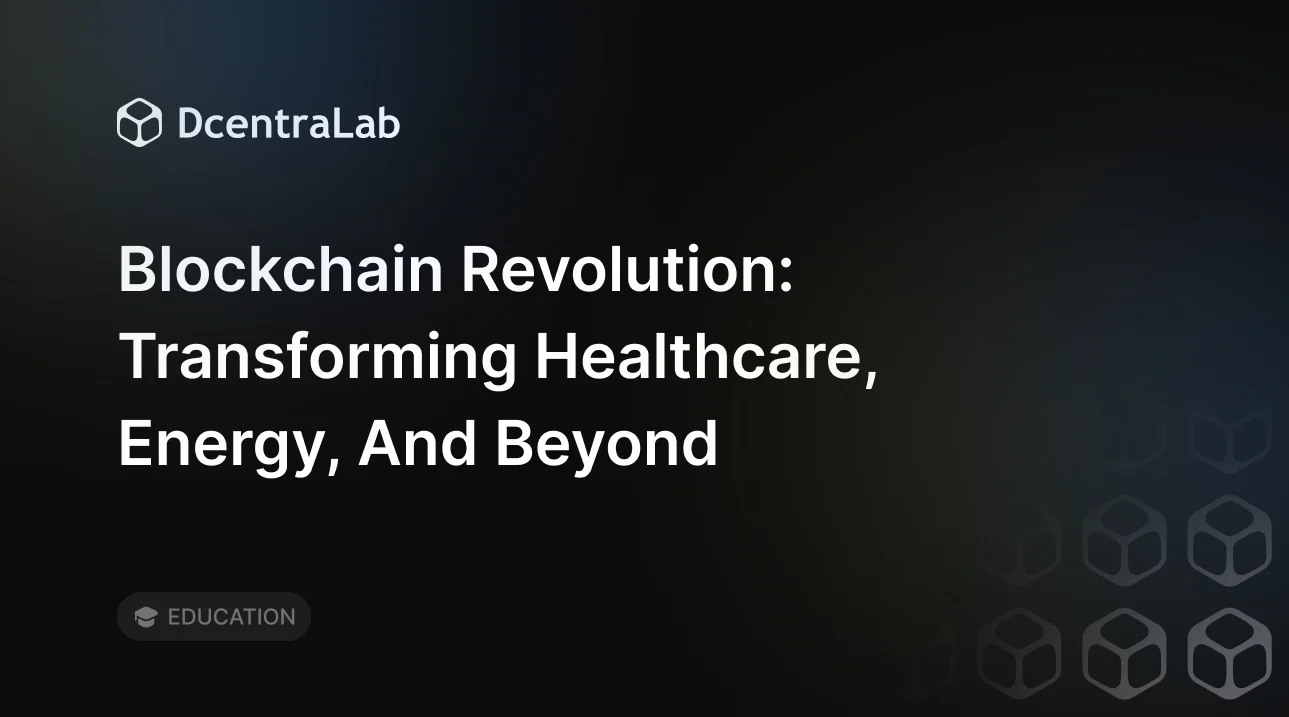Blockchain Revolution: Transforming Healthcare, Energy, and Beyond

tl;dr
- Blockchain enhances security, transparency, and efficiency across industries.
- Initially used for cryptocurrencies, it now secures patient records, optimizes energy grids, and more.
- Blockchain in healthcare ensures secure, tamper-proof patient data storage.
- Blockchain in energy enables peer-to-peer trading of renewable energy.
- Improves government accountability with blockchain-based voting and land registries.
An Introduction to Less Typical Blockchain Applications
Blockchain technology is revolutionizing industries by enhancing security, transparency, and efficiency. Initially known for powering cryptocurrencies, it is now being adopted across various sectors. From securing patient records in healthcare to optimizing energy grids, blockchain offers innovative solutions to real-world challenges.
This article explores how blockchain is transforming healthcare, energy, and beyond, showcasing its potential to reshape industries
Blockchain in Healthcare: Secure and Interoperable Data
By design, blockchain creates an immutable and tamper-proof ledger where data is encrypted and distributed across a decentralized network. This eliminates the risk of unauthorized access, data breaches, and data manipulation, ensuring that patient records remain confidential and secure.
This enhanced privacy and control can foster trust between patients and healthcare providers, encouraging greater data sharing and collaboration.
Enhancing Data Security and Privacy
Blockchain technology provides a robust solution for protecting sensitive patient data from unauthorized access. Leveraging cryptographic techniques such as zk-proofs and fully homomorphic encryption (FHE) ensures that patient information remains confidential while still being verifiable. Unlike traditional centralized databases, which are vulnerable to breaches, blockchain distributes data across a decentralized network, reducing the risk of single points of failure. With immutable and truely confidential records, any tampering attempts become immediately evident, enhancing security and trust in healthcare data management.
Improving Data Interoperability and Sharing
One of the greatest challenges in healthcare is the fragmented nature of patient records across different institutions. Blockchain facilitates seamless and secure data exchange between healthcare providers by enabling a shared, decentralized ledger. With the ability to verify and synchronize records in real time, blockchain reduces administrative inefficiencies and minimizes the risk of errors in patient history. This interoperability improves patient care by ensuring that doctors and specialists have access to accurate medical information, while researchers can analyze anonymized data sets for medical advancements without compromising patient privacy.
Streamlining Supply Chain Management
The pharmaceutical and medical device industries face major issues with counterfeiting and inefficiencies in tracking products. Blockchain enhances supply chain transparency by recording each transaction on an immutable ledger, ensuring that every step—from manufacturing to distribution—is traceable. Smart contracts automate compliance checks, reducing fraud and ensuring the authenticity of drugs and medical equipment. This system enhances drug safety, preventing counterfeit products from entering the market and improving overall supply chain efficiency.
Patient-Centric Health Records
Blockchain empowers individuals by giving them control over their own health records. Patients can grant or revoke access to healthcare providers as needed, ensuring that their data is only shared with trusted parties. With portable and secure blockchain-based records, individuals can transfer their medical history between providers, reducing redundancy in diagnostics and improving treatment continuity. By shifting control from institutions to patients, blockchain fosters a more transparent and patient-focused healthcare system.
Blockchain in Energy: Decentralized and Sustainable Solutions
Blockchain technology enables a decentralized energy grid, allowing peer-to-peer trading and tokenization of energy assets. Surplus green energy can be efficiently redirected to Bitcoin mining, maximizing sustainability. By recording transactions transparently, blockchain enhances grid efficiency, reduces waste, and empowers consumers to buy and sell renewable energy.
By doing so, blockchain technology could reach Enron’s dream, but transparently and with less fraud. The now defunct company Enron envisioned and launched energy trading in the late 90s and early 2000s.
Enabling Peer-to-Peer Energy Trading
Blockchain technology is transforming the energy sector by enabling direct transactions between consumers and producers. Through decentralized platforms, households with solar panels or wind turbines can sell excess energy to neighbors without relying on traditional utilities. This P2P energy trading system ensures a more efficient and cost-effective energy market.
By reducing dependence on centralized providers, blockchain fosters the adoption of renewable energy, lowers costs, and increases access to clean power sources. Smart contracts facilitate these transactions automatically, ensuring fair pricing and transparency while eliminating intermediaries.
Improving Grid Management and Efficiency
Energy distribution has long been plagued by inefficiencies, losses, and imbalances in supply and demand. Blockchain, combined with smart contracts, can optimize grid management by automating energy flow based on real-time data. Decentralized ledgers allow for instant verification of energy transactions, reducing errors and inefficiencies. Utilities can also leverage blockchain for demand response programs, rewarding consumers who adjust energy consumption during peak hours. By integrating blockchain with IoT devices, the energy grid can become more resilient, self-regulating, and adaptive to fluctuations, reducing waste and enhancing sustainability.
Tracking Renewable Energy Certificates (RECs)
RECs play a crucial role in carbon offsetting, but traditional systems often lack transparency and authenticity. Blockchain ensures that RECs are verifiable, traceable, and tamper-proof, preventing fraud and double counting. Each certificate is recorded on a decentralized ledger, allowing buyers to confirm its origin and impact.
This trustless system promotes greater accountability, encouraging businesses and individuals to invest in sustainable energy.
Microgrids and Decentralized Energy Systems
Blockchain is driving the development of microgrids, which are localized, self-sufficient energy systems that operate independently or alongside the main grid. These decentralized networks enable communities to manage their energy resources more effectively, enhancing resilience in the face of natural disasters or grid failures.
By using blockchain to verify energy production, consumption, and distribution, microgrids can operate transparently and securely. Smart contracts further automate energy allocation, ensuring that power flows where it is needed most.
Blockchain Across Other Industries: Transforming Operations
Blockchain technology has the ability to reduce inefficiencies across a wide range of industries. The transparency and security it provides can be beneficial to many, including supply chain management, financial services, and even governments.
Supply Chain Management: Enhancing Traceability and Transparency
Blockchain is revolutionizing supply chains across industries by providing immutable records of product journeys. In the food industry, blockchain ensures traceability from farm to table, helping prevent contamination and fraud. Retailers use blockchain to verify the authenticity of luxury goods, reducing counterfeit products in the market. In manufacturing, blockchain streamlines inventory management and supplier verification, ensuring that parts and materials meet quality standards.
Financial Services: Streamlining Transactions and Reducing Fraud
Traditional financial systems rely on intermediaries, leading to slow and expensive transactions. Blockchain eliminates these inefficiencies by enabling fast, secure, and cost-effective cross-border payments. Smart contracts automate processes such as loan disbursements and settlements, reducing delays and administrative costs. Additionally, blockchain’s transparency helps combat financial fraud and money laundering by providing a tamper-proof record of transactions.
Government and Public Sector: Enhancing Accountability
Governments are adopting blockchain to improve transparency in public services. Blockchain-powered voting systems ensure election integrity by preventing tampering and unauthorized access. Land registries benefit from decentralized ledgers that protect property records from fraud and corruption.
Intellectual Property and Digital Rights Management
Blockchain provides a secure way to establish digital ownership and protect intellectual property. Artists, musicians, and content creators can tokenize their work using NFTs, ensuring they receive fair compensation for their creations. Digital rights management powered by blockchain prevents unauthorized distribution and piracy, enabling creators to monetize their content more effectively.
Benefits of Blockchain Implementation in Industry
Blockchain implementation offers enhanced data security and privacy through cryptographic encryption and decentralized storage, protecting sensitive information across industries.
Increased transparency and traceability ensure verifiable transactions, reducing fraud and improving accountability. Automation through smart contracts streamlines operations, eliminating inefficiencies and human errors. By removing intermediaries, blockchain reduces costs associated with financial transactions, supply chains, and administrative processes.
This decentralized approach fosters trust, accelerates workflows, and enhances overall efficiency. Businesses and governments benefit from improved security, reduced operational expenses, and greater data integrity, making blockchain a transformative force in modern digital ecosystems.


%20Payments.webp)
